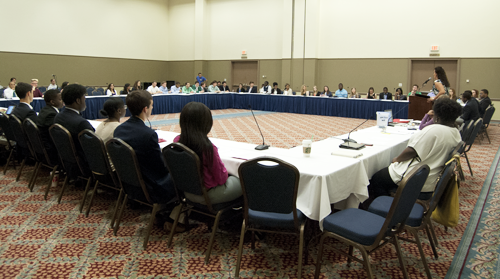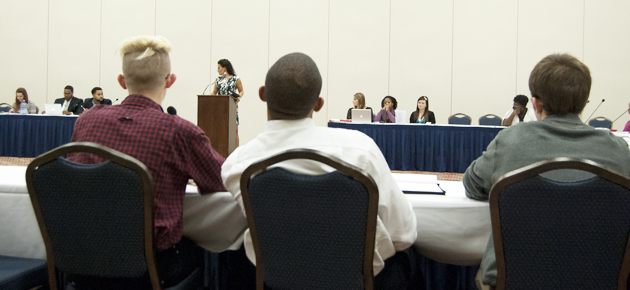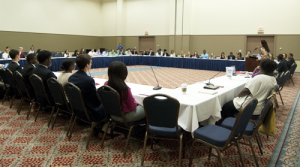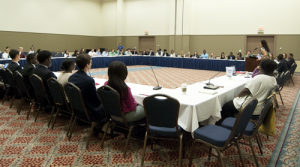SGA breaks down the possible tobacco-free policy
February 5, 2014
Student Government Association hosted a forum last night to break down the new possible policy concerning all University System of Georgia (USG) colleges that will make all campuses in Georgia tobacco-free.
If approved, the policy will go into effect July 1 of this year and will completely cut out all tobacco use on campuses, including cigarettes and smokeless tobacco, among others.
Breaking down the policy
The policy goes along with the Georgia Smoke Free Air Act of 2005 and is meant to provide a safe and amicable workplace for all employees and any persons occupying USG facilities, according to the policy.
“The use of all forms of tobacco products on property owned, leased, rented or in possession in any way used by the USG or its affiliates is expressly prohibited,” Garrett Green, president of SGA, read from the USG policy.
Along with that, all cigarettes, cigars, pipes, all forms of smokeless tobacco, clove cigarettes and any other smoking devices that use tobacco such as hookahs or simulate the use of tobacco such as electronic cigarettes.
No tobacco will be allowed indoors or outdoors, buildings or parking lots owned in any way by the USG. Private and public cars in these areas also fall under the tobacco-free jurisdiction.
Any person on USG property must follow these guidelines and if they are found in violation will be reprimanded depending on their role in the university.
Who is affected?
Visitors on campus that do not comply with these policies will be asked to leave the USG area.
Employees in violation will be addressed according to the disciplinary process as outlined in the human resources administrative practice manual. Along with that, the chief human resources officer for the campus must report an employee violation to the USG office of employee benefits. The employee will then be charged a tobacco surcharge and will continue doing so until they prove in writing that they were smoke-free for a minimum of six months.
Any student on campus must comply by the regulations laid out in the policy, including students that live on-campus. If this tobacco-free policy is passed, then the current smoking zones for on-campus residents will be eliminated and any campus resident wanting to smoke must leave campus to do so.
It is still unclear how students will be dealt with if a violation does occur.
Enforcement of the Policy
If the policy is enforced, there will more than likely be a mass marketing campaign launched to educate students on the new policy and what it means for them day-to-day.
In a meeting between Green and Brooks Keel, president of GSU, the topic of how to enforce the policy among students was addressed.
“[Keel] didn’t want police officers to be walking down the pedestrium looking for nothing but people who are smoking or using tobacco products,” Green said. “What he did hope for was after we start seeing changes in our tradition, people really start to enforce the policy themselves. If you see somebody smoking, you’ll be able to say hey, Georgia Southern is a smoke-free campus.”
If that does not work, then students can call University Police to report a smoker and it will be up to their discretion from there.
Attitudes about tobacco-use from students, faculty and staff
In Dec. 2011, survey results regarding campus attitudes about tobacco use was released and was meant to show what the next steps should be regarding tobacco use, America Minc, director of student affairs for campus recreation intramurals, said.
“We also wanted to see what does the campus feel would be the next best step for Georgia Southern to make a decision to go either completely tobacco free, to go to campus smoking zones, or to make no change in the current policy,” Minc said.
From that survey, the following results were found:
Student vote
46% tobacco zones
28% tobacco-free
26% no change to current policy
Faculty and Staff vote
46% tobacco zones
32% tobacco-free
22% no change to current policy
Further, it was found that 77% of reporting students are non-users of tobacco and 82% of faculty and staff are also non-users.
Moving forward
Green will present the opinions from students to fellow SGA presidents at a Student Advisory Council meeting today in Atlanta.
The Board of Regents will be voting on the policy at their next meeting, which is scheduled to be on Feb. 11, and 12.










